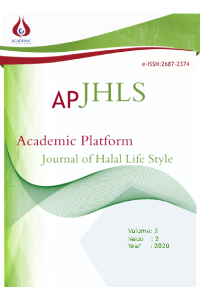Abstract
Dünya genelinde insanlar, dinleri veya uyguladıkları diyetlerin bir gereği olarak besin değeri yüksek, temiz ve hijyenik koşullara uygun olarak hazırlanmış sağlıklı gıdaları talep etmekte veya tüketecekleri gıdaya daha bilinçli yaklaşmaktadırlar. Tüketiciler sentetik gübre ile yetiştirilen bitkisel ürünler ile katkı maddesi ve doğal olmayan kimyasal maddeleri içeren gıdaları tüketmek istememektedirler. Helal, temiz ve sağlıklı gıdaları tüketmek Müslümanların inançlarının bir gereği olup bu işlem aynı zamanda, dini vecibelerin de özgürce yerine getirilmesidir. Tanım olarak Helal gıda, Kurandaki ayetler ve Peygamberimizin hadislerinden yola çıkılarak İslam’ı kaygılar yanında hijyenik kurallara da riayet edilerek üretilen ve tüketilen yiyeceklerdir. Günümüz koşullarında dindar insanların özellikle de duyarlı Müslümanların, tüketecekleri gıdaları detaylı bir şekilde sorgulamaları ve bunların helal olduğundan emin olmaları önerilmektedir. Müslüman tüketicilerin yoğun olarak yaşadığı Malezya, Endonezya ve Türkiye gibi ülkeler ile Amerika, Kanada ve bazı Avrupa ülkeleri gibi Müslüman nüfusunun daha az olduğu ülkelerde helal ve sağlıklı gıda arz ve talebi giderek önem kazanmakta ve helal pazarı, her geçen yıl daha da artmaktadır. Dünyada ve birçok ülkede artan Müslüman sayısı ve genişleyen pazar hacmi ile ülkeler arası ithalat ve ihracat daha da artmış ve bu da helal ürünleri, standart hale getirme veya sertifikalandırma mecburiyetini doğurmuştur. Bunun sonucu olarak helal gıda kalite yönetim sistemleri geliştirilmiş ve bu amaca yönelik pek çok resmi ve özel kuruluş ülkemizde ve dünyada faaliyete başlamıştır. Bu bölümde, helal gıda üretimi ve tüketimi yanında sağlıklı beslenme konusunda da dindar tüketicilerin bilinçlendirilmesi amaçlanmıştır. Ayrıca helal gıda ve içeceklerin üretiminde dikkate alınması gereken konular ile istihlak, istihale ve katkı maddeleri gibi güncel konular hakkında da detaylı bilgi verilmiştir.
Keywords
References
- Abdul, M., Ismail, H., Hashim, H. ve Johari, J. (2009). Consumer decision making process inshopping for halal food in Malaysia. China-USA Business Review, 8(9), 40-47.
- Ahhmed, A. ve Yetim, H. (2019). Why Killing the Animals by Stunning is not Halal and Inhuman? 5th World Halal Summit 2019, Istanbul.
- Akbulut, M, Daştan, Ş, Can, E, Si̇pahi̇oglu, O. (2020). Genç tüketicilerin helal sertifikası konusunda farkındalığı ve bunun gıda tercihi üzerine etkileri: Kayseri ili örneği. Helal ve Etik Araştırmalar Dergisi, 1(2), 110-121.
Abstract
People around the world demand healthy foods that are prepared in accordance with their religious beliefs or the diets they follow, which are high in nutritional value, clean and hygienic. So, the people has become more conscious for the food that they intend to consume. Consumers generally prefer natural or ecological products rather than the plants that are grown with synthetic fertilizers or pesticides and the foods containing additives or related chemicals. Consuming Halal, clean and healthy food has become main principles of Muslims, and this is considered as a personal right to follow the rules that required by their religion. By definition, halal food is produced and consumed in accordance with the verses in the Qur'an and the hadiths of the Prophet, with the concern of Islamic laws and hygienic rules. Nowadays, Muslims should always question the foods that they will consume in detail to make sure that they are halal. Halal food supply and demand is becoming increasingly important in the countries where Muslim population is in majority like Malaysia, Indonesia and Turkey and in some countries with less Muslim population like America, Canada and European countries. In this respect, halal food market has been growing for each year with the increasing Muslim population. So, expanding halal market volume, imports and exports between the countries increased further, and this led to necessitate standardize or certify halal foods in line with the trust of consumers. As a result, halal food quality management systems have been developed by many official bodies and private organizations in the world and in this country as well. In this chapter, we plan to raise awareness among the consumer on healthy, nutritious and halal food production, and discussing the issues that people face currently. In addition, detailed information is given for the production and consumption of halal food and beverages, and deal with the current issues like Istihālah, istihlāk and food additives.
Keywords
References
- Abdul, M., Ismail, H., Hashim, H. ve Johari, J. (2009). Consumer decision making process inshopping for halal food in Malaysia. China-USA Business Review, 8(9), 40-47.
- Ahhmed, A. ve Yetim, H. (2019). Why Killing the Animals by Stunning is not Halal and Inhuman? 5th World Halal Summit 2019, Istanbul.
- Akbulut, M, Daştan, Ş, Can, E, Si̇pahi̇oglu, O. (2020). Genç tüketicilerin helal sertifikası konusunda farkındalığı ve bunun gıda tercihi üzerine etkileri: Kayseri ili örneği. Helal ve Etik Araştırmalar Dergisi, 1(2), 110-121.
Details
| Primary Language | Turkish |
|---|---|
| Subjects | Health Care Administration |
| Journal Section | Articles |
| Authors | |
| Publication Date | December 31, 2020 |
| Acceptance Date | November 16, 2020 |
| Published in Issue | Year 2020 Volume: 2 Issue: 2 |


